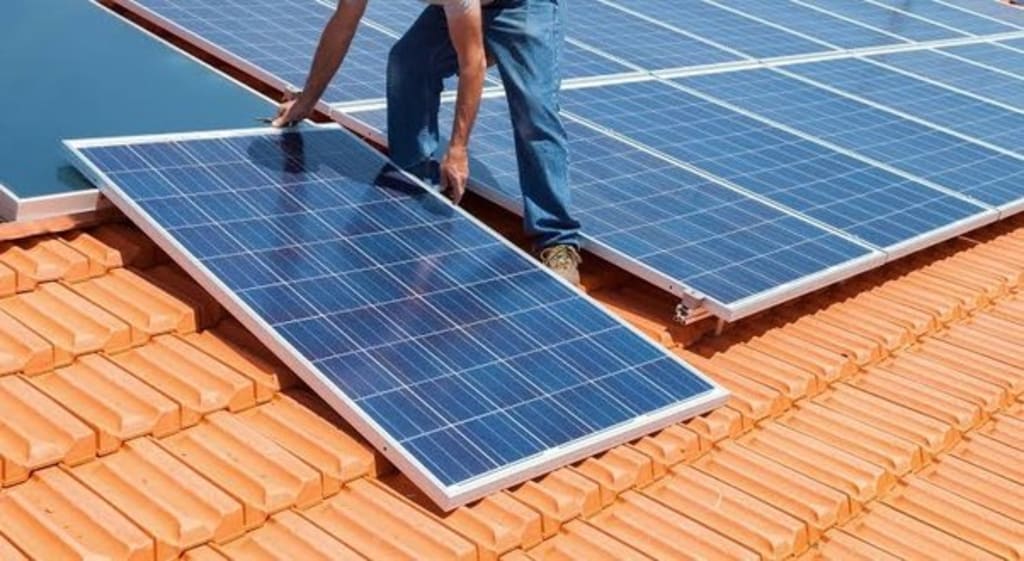Why is It a Good Step to Install Solar Panels for Home?
Rooftop Solar Panels Installation Guide - Step by Step

In urban and rural India, the roofs of millions of residential and commercial buildings receive abundant sunlight during the day. These are ideal for harnessing solar energy and converting it into electricity. Since most appliances run on AC power, this can be accomplished by adding an interface called an inverter that converts the DC power produced by rooftop solar panels into AC power.
What Are rooftop solar panels?
A rooftop solar panel is a photovoltaic module installed on the roof of a commercial, government, or residential building. It captures the light energy emitted by the sun and converts it into electrical energy. This system is also called a rooftop solar power system. Generate clean and environmentally friendly energy. This means it does not produce pollutants or harmful gasses.
There are Three Types of Solar System
1. On-grid system
One of these is an on-grid system, where a rooftop solar power system is integrated into the main grid. This system allows power to be used from the grid only when the rooftop solar system cannot provide the required power. Therefore, a well-planned rooftop system can provide power efficiently without relying on the power grid, thereby saving costs that would otherwise be incurred by using power from the power grid.
2. Off-grid system
The second is an off-grid system, where the rooftop solar power system is not connected to the main grid. The system can operate autonomously with its own battery. The solar power generated by the rooftop solar array charges the battery, which is then used to power a variety of applications. This system is very useful when there is no mains power supply or when the power supply is very irregular and frequently fails.
3. Hybrid system
The third system is a hybrid system where both on-grid and off-grid systems work together. This type of system uses a battery, but has the advantage that once the battery is fully charged, the surplus electricity generated is fed into the grid, providing additional income to the consumer.
Feasibility of Power Generation Roofs
When it comes to rooftop solar panels for households, the condition of the roof is very important in determining the feasibility. The following factors should be considered:
Year-round sunlight availability and usable roof area are important factors when calculating the amount of power that can be generated. A typical home solar panel can produce about 290 watts when used for one hour of direct sunlight. The direction in which the roof faces the sun is important. South-facing is the ideal orientation for the panels. If your roof is naturally sloped and faces south, it is ideal for installing rooftop solar panels. This is because India is located in the northern hemisphere and the earth rotates diagonally around its axis, so south-facing roofs receive maximum sunlight. However, if your roof is flat, you should install your solar panels at a south-facing angle to receive maximum sunlight. Additionally, tall buildings must not block solar radiation from solar panels.
The decision to choose the right type of rooftop solar power system will affect the cost of the system. Each type contains different components and costs vary by type.
How Much Rooftop Solar Panels Should I Use?
You can determine the maximum power you can generate based on solar availability and available space on your roof. Additionally, depending on the type of system (on-grid, off-grid, hybrid), homeowners can decide how much roof space they want to reserve for power generation.
Cost-effectiveness
Homeowners can do a cost analysis and decide how much electricity they want to produce to make a profit. This can include determining how much electricity can be sent to the grid to meet the electricity needs of homeowners and generate additional revenue.
Rooftop solar panels are becoming a popular source of electricity as they are a renewable energy source that is abundantly available during the day. With careful planning, the right rooftop solar power system can provide unlimited power supply with minimal recurring costs.
The global solar power market is making Mother Earth a healthy and safe place to live. Rooftop solar modules only require space and sufficient sunlight to operate efficiently. On days when the sun is bad, the battery built into the module will be your savior.
Job creation
Manufacturing solar panels and additional components is labor intensive and requires some skilled workers. Construction of solar roof systems also requires direct and indirect labor. After installation, technicians are busy ensuring proper service and maintenance of these rooftop solar panels. However, this number is relatively small, as solar power systems usually work without problems. According to a report published by Bridge to India, the highest employment generation is achieved by installing rooftop solar panels. There are many other job opportunities open to you in the solar industry, including manufacturing, design, business development, management, design and drawing, project development, accounting, and more.
Environmental Impact
Rooftop solar panels require only sunlight to generate electricity, making them a cleaner source of energy than other common energy sources. Its renewable nature promises sustainability. Solar roofs pose no health risks and do not emit pollutants. No additional area is required to construct the roof. Widespread use of solar roofs can help minimize global warming.
Economic Effects of Solar Rooftops
Rooftop solar panels are very cost-effective. These are one-time investments that will benefit nature and society for a much longer period of time. In the long run, it proves to be more cost-effective compared to diesel generators and grid electricity. Anyone who switches to solar energy will experience a significant reduction in their electricity bill and end up saving a lot of money.
Rooftop Solar Panels in Residential Area
Currently, solar roofs are increasingly being used in residential areas, both in large complexes and in medium to large private apartments. Having a solar roof system installed also increases the resale value of your home. The money spent on shocking electricity bills will be reduced and the money saved will help your family invest in a better lifestyle.
Social Impact of Rooftop Solar Panels
Building rooftop solar panels is also a philanthropic endeavor. It benefits not only the environment but also society as a whole. There are schools and universities in various small districts of the country with insufficient electricity supply. This poses a threat to students' education, with power shortages preventing students in villages from attending digital classes, especially at night, and studying due to darkness. All these problems can potentially be solved by implementing solar power technology.
About the Creator
Bluebird Solar
With a 40-year-old reputed brand name, Bluebird Solar is one of India's leading solar panel manufacturers.






Comments
There are no comments for this story
Be the first to respond and start the conversation.